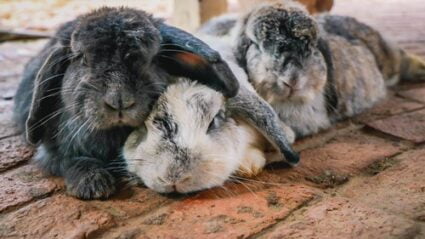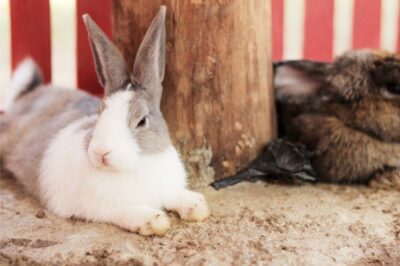Understanding a rabbit’s eyes is a critical part of lagomorph husbandry. Many rabbit owners never see their pets blink. Rabbits never appear to close their eyes during the day or night. This may leave you wondering if your rabbit ever sleeps.
Rabbits have a third eyelid called the nictitating membrane, which is invisible to the human eye. This translucent eyelid closes while a rabbit is sleeping.
The nictitating membrane helps a rabbit retain a constant state of vigilance while sleeping. It allows your pet to react if she sees something threatening. She will be awake in an instant and will likely flee to a safer location. No rabbit will close her eyes unless she feels completely safe.
Do Rabbits Have a Third Eyelid?
Rabbits have a third eyelid (the nictitating membrane) that is invisible to human sight. It is located at the front of the rabbit’s eye. Don’t look for it as it’s completely transparent. The nictitating membrane serves many functions for your pet and is one of the most vital parts of her anatomy.
- Acts as a shield. It prevents grit, dirt, and other irritants from entering your rabbit’s eye.
- Keeps your pet’s eyes moist. This means she does not need to blink as often as humans.
- A rabbit can doze without fully closing her eyes. This is critical to the survival of wild rabbits.
- Makes the rabbit look awake. This dissuades other rabbits from stealing food or territory. It can also deter predators from attacking her.
Watching your pet, you may think that your rabbit is sleeping with her eyes open. This can look disconcerting until you grow accustomed to it.
Your rabbit is asleep, and technically her eyes are not open. The nictitating membrane has closed. It’s just too faint for you to see. This allows your rabbit to sleep while also remaining alert.
Do Rabbits Sleep with Their Eyes Open or Closed?
Rabbits can sleep with their eyes open or closed. It depends on how relaxed/tired your rabbit is. Rabbits sleeping with their eyes open are still sleeping. The nictitating membrane closes. This blocks enough light for your rabbit to feel comfortable. She will contentedly doze in these conditions.
Rabbits rarely feel entirely safe. As prey animals, rabbits are on the lookout for predators, even while they are sleeping. Rabbit vision is engineered to notice movement from long distances.
By sleeping with her eyes open, but the nictitating membrane closed, a rabbit can act quickly. If she has any reason to feel that she is in danger, the rabbit will detect this while asleep.
Think of it this way. If you are lightly dozing but an alarm sounds, your eyes are likely to snap open. You will be alert and ready to react. If you are fast asleep at 6 am and your morning alarm rouses you, you’ll feel groggier.
The same logic applies to rabbits. Being fast asleep with her eyes closed costs precious seconds of reaction time. For a wild rabbit, these seconds could be the difference between life and death.
Your pet will not have these worries. You are not going to harm her, and you protect her from other predators. Instinct is hardwired into rabbits, though. Most domesticated pets will nap with their eyes open as a precaution. They never know when a crafty cat may appear, for example.
If you keep two rabbits, you may notice they take turns sleeping with their eyes open. Again, this is due to wild instincts. In a warren, rabbits watch over each other in shifts.
Do All Rabbits Sleep with Their Eyes Open?
Sleeping with the eyes open is an instinct that all rabbits share. A rabbit will only close her eyes to sleep if she feels completely relaxed. This may never happen if your pet has a nervous disposition.
Over time, you may find that your rabbit is content to sleep with her eyes closed. This is an excellent sign as your rabbit trusts you implicitly.
You will most likely find your rabbit sleeping with her eyes closed after playtime. Rabbits are at their most energetic mid-morning. Your pet will exhaust herself running at this time.
Once your rabbit is finished, she will not be able to fight her eyes any longer. She will drop on the spot and fall into a deep sleep. This is known as flopping. It looks worrying at first. New rabbit owners often mistake flopping for a heart attack.

If your rabbit has flopped, do not wake her. Rabbits flop on the spot without any thought for logistics. They may be located in the middle of the room, or under your chair.
If you’re able to do so, scoop your pet up without waking her. You can move her to a more convenient location, such as your bed or her hutch. If you risk waking your rabbit, leave her alone. Don’t make any loud noises or touch her.
If your pet is wrenched from sleep, she will likely bite or nip at you. This isn’t because your rabbit is grumpy. It’s a fear-based response. She was expecting to come around at her own pace.
How Do I Know if My Rabbit is Sleeping?
Understanding when your rabbit is asleep can enhance your bond. If your rabbit trusts that you’ll leave her alone while she’d dozing, she’ll trust you more. She’ll then close her eyes to sleep.
A rabbit with closed eyes is not necessarily asleep, though. She may be expressing contentment and relaxation. Never underestimate this. Your rabbit is surrendering herself to you. Do not make a loud noise, or touch a part of her anatomy that she dislikes.
Some vital signs that your pet is asleep, regardless of her eyes, include:
- Folded, inactive ears. Rabbits don’t just watch for danger while they doze; they listen too. If your pet’s ears are down, she is no longer listening.
- A perfectly still nose. Rabbits have an excellent sense of smell. Your pet’s nose will twitch whenever she is awake. If she’s asleep, she’ll give her nose a rest.
- Slow-and-steady breathing. Your rabbit’s chest will rise and fall at a slower rate than you’re used to. This is because your rabbit is contented and relaxed.
- Teeth chattering. Your rabbit will gently chatter her teeth together while she sleeps. This is a form of rabbit purring. It means that she is enjoying catching up on her sleep.
- Rabbits dream. Popular opinion suggests that your pet is reliving the events of her day. If she has flopped after exercise, she is running in her sleep.
The time of day and location of your rabbit will also provide insights. Rabbits are crepuscular. This means they are most active at dawn and dusk.
Most rabbits want to play from early to mid-morning then sleep until early evening. They then wake up filled with energy, and sleep again after dark. If your rabbit is motionless at midnight or midday, she is likely asleep.
Look at where your rabbit is located. If your rabbit actively plans to sleep, she will typically find somewhere private. Wild rabbits sleep underground, and your pet will aim to replicate this. She’ll look for a dark, covered location.
Rabbit Asleep with Eyes Open vs. Staring at Me
To add an extra layer of complication, some rabbits stare into the middle distance. The rabbit has heard or smelled something, and is assessing how to feel about it. This can make it difficult to tell if a rabbit is asleep or just staring.
In this instance, make the subtlest movement that you can. Slowly raise one finger to the left or right. If your rabbit’s eyes move along with your finger, she is likely asleep. Her vision has instinctively picked up on the movement.
A rabbit that is awake and processing a sensation will continue staring at you. This serves two purposes. She is protecting you. She will not move until she is sure that you’re not in danger.
Perhaps more importantly, your rabbit is assessing your reaction. She’s waiting to see if you panic. If so, she’ll know that this new sound or smell denotes danger. If not, she’s prepared to trust your judgment and remain calm for now.
A typical rabbit will sleep for around eight hours per day. It may not seem this way at first. You’ll soon understand when your rabbit is dozing though, even when her eyes are open.
If you’re not sure, always assume that your rabbit is asleep. That means taking certain precautions around her. Keep noise to a minimum, and don’t touch her unnecessarily. Just because her eyes are open, it doesn’t mean your pet is awake.

